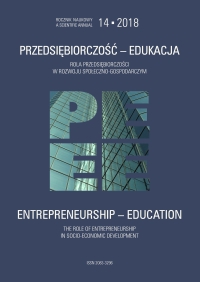Situation of NEETs in Poland and Proposals for Developing their Entrepreneurial Competences in Light of the Results of the RLG Project
DOI:
https://doi.org/10.24917/20833296.14.29Keywords:
entrepreneurial competences, entrepreneurship education, NEET, RLG, youth unemploymentAbstract
The subject of the article is the situation of NEET youth (ang. not in employment, education or training) in Poland against Europe. In the article, the authors present the diversity of the share of youth NEET in European countries, paying special attention to unemployed young people and early school leavers. They diagnose the situation of NEETs in Poland using an expert-statistical model of monitoring the situation on the labour market and an indicator of the synthetic situation of young people on the labour market, and on this basis indicate the opportunities for improving the situation of NEETs. Special opportunities in this respect are attributed to the development of their entrepreneurial skills, indicating the deliberate use of educational programs co-financed from EU funds, aimed at shaping entrepreneurial attitudes (in particular, the achievements of the RLG project). This program can be used, inter alia, as part of entrepreneurship classes, both as part of a curriculum based on the current core curriculum for upper secondary schools and in the future in programs based on the new core curriculum for secondary schools.References
Balcerowicz-Szkutnik, M., Wąsowicz, J. (2017). Pokolenie NEETs na rynku pracy – aktualne problemy. Studia Ekonomiczne. Zeszyty Naukowe Uniwersytetu Ekonomicznego w Katowicach, 312, 7–17.
Borowiec, M., Rachwał, T. (2011). Kształtowanie postaw przedsiębiorczych na lekcjach geografii wyzwaniem edukacyjnym w procesach globalizacji, Przedsiębiorczość – Edukacja, 7, 321–332.
Główny Urząd Statystyczny. (2018a). Informacja o sytuacji społeczno-gospodarczej kraju w 2017 r. Warszawa: GUS.
Główny Urząd Statystyczny. (2018b). Popyt na pracę w 2017 r. Warszawa: GUS.
Kompetencje kluczowe w uczeniu się przez całe życie. Europejskie Ramy Odniesienia (2007). Urząd Oficjalnych Publikacji Wspólnot Europejskich. Luxembourg.
Krause, E. (2016). Zjawisko NEET, czyli o młodzieży trzy razy nic. Problemy Profesjologii, 2, 67–81.
Mazowieckie Obserwatorium Rynku Pracy, Wojewódzki Urząd Pracy w Warszawie. (2014). Wsparcie młodych osób na mazowieckim rynku pracy. Warszawa.
Osuch, W. (2011). Kompetencje w zakresie komunikacji interpersonalnej w dobie postępujących procesów globalizacji. Przedsiębiorczość – Edukacja, 7, 333–346.
Piróg, D. (2014). Kompetencje z zakresu przedsiębiorczości: rozważania teoretyczne i ich ilustracje w obszarze szkolnictwa wyższego. Przedsiębiorczość – Edukacja, 11, 364–376.
Płaziak, M., Szymańska, A.I. (2014). Otwartość na innowacje jako przejaw przedsiębiorczości ludzi młodych na przykładzie studentów uczelni krakowskich, Horyzonty Wychowania, 13(26), 267–286.
Polska Agencja Rozwoju Przedsiębiorczości. (2017). Bilans kapitału ludzkiego. Warszawa.
Rachwał, T. (2005). Kształtowanie postaw u uczniów na lekcjach przedsiębiorczości. Przedsiębiorczość – Edukacja, 1, 137–144.
Rachwał, T. (2017). Entrepreneurship in School in the Conditions of the Education System Reform in Poland – a Voice in the Discussion on the Directions of Change. Przedsiębiorczość – Edukacja, 13, 330–339.
Rozporządzenie Ministra Edukacji Narodowej z dnia 27 sierpnia 2012 r. w sprawie podstawy programowej wychowania przedszkolnego oraz kształcenia ogólnego w poszczególnych typach szkół (Dz.U. 2012 poz. 977).
Rybicka, K. (2014). Sytuacja młodzieży na polskim rynku pracy, Zeszyty Naukowe Uniwersytetu Szczecińskiego. Studia i Prace Wydziału Nauk Ekonomicznych i Zarządzania, 37(2), 105–116.
Saczyńska-Sokół, S., Łojko, M. (2016). Sytuacja młodzieży NEET na rynku pracy. Zeszyty Naukowe Uniwersytetu Przyrodniczo-Humanistycznego w Siedlcach. Administracja i Zarządzanie, 108, 97–106.
Szcześniak, M., G., (2011). Pokolenie „ani-ani”: o młodzieży, która się nie uczy, nie pracuje i nie dba o samokształcenie, Psychologia Społeczna, 3(18), 241–251.
Świętek, A. (2012). Oczekiwania a realia wejścia ludzi młodych na rynek pracy jako wyzwanie dla edukacji z przedsiębiorczości, Przedsiębiorczość – Edukacja, 8, 137- 154.
Świętek, A. (2014) Czy ekonomia w praktyce będzie przydatna w praktyce? Przedsiębiorczość – Edukacja, 10, 378–391.
Wach, K. (2013). Edukacja na rzecz przedsiębiorczości wobec współczesnych wyzwań cywilizacyjno-gospodarczych. Przedsiębiorczość – Edukacja, 9, 246–257.
Wach, K. (2014). Edukacja dla przedsiębiorczości: pomiędzy przedsiębiorczą pedagogiką a edukacją ekonomiczną i biznesową. Horyzonty Wychowania, 13(28), 11–31.
Wojewódzki Urząd Pracy w Białymstoku. (2014). Model monitorowania sytuacji osób młodych na rynku pracy. Białystok.
Downloads
Published
How to Cite
Issue
Section
License
Articles are published under the terms of the Creative Commons License (CC BY-ND 4.0; Attribution– NoDerivs).

